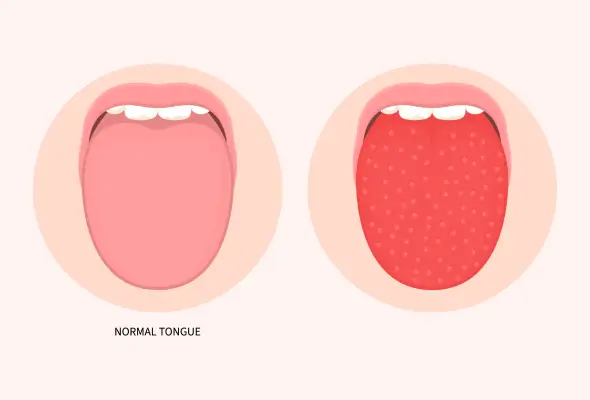Swollen Tongue:-The tongue is a vital organ that plays a crucial role in tasting, swallowing, and speaking. When the tongue swells, it can become uncomfortable and even interfere with these essential functions. A swollen tongue, medically referred to as glossitis, can be a sign of various health conditions, some mild and others more severe. Understanding the causes, symptoms, and remedies is key to managing this condition effectively.

What is a Swollen Tongue:-
A swollen tongue occurs when the tissue in the tongue expands, leading to noticeable enlargement, redness, and sometimes pain. The swelling may affect the entire tongue or just a specific area. While it can be temporary and mild in some cases, it may indicate an underlying health issue if persistent or severe.
Common Causes of a Swollen Tongue:-
1. Allergic Reactions: One of the most common causes of a swollen tongue is an allergic reaction, also known as anaphylaxis. Certain foods (like nuts, shellfish, or dairy), medications, or insect stings can trigger this response. In such cases, swelling can occur rapidly and may require immediate medical attention as it can block the airway, leading to a life-threatening situation.
2. Infections: Viral, bacterial, or fungal infections can cause inflammation and swelling of the tongue. Conditions like oral thrush (a fungal infection caused by Candida) or herpes simplex virus can lead to swelling along with other symptoms like white patches or blisters on the tongue.
3. Trauma or Injury: Accidental biting, burns from hot food or drinks, or irritation from dental appliances such as braces can cause localized swelling. Repeated trauma, such as from grinding teeth or poorly fitted dentures, may lead to chronic swelling.
4. Vitamin Deficiencies: A deficiency in certain vitamins, especially vitamin B12, iron, and folate, can lead to a swollen tongue. These vitamins are essential for maintaining healthy tissues, and their deficiency can result in glossitis.
5. Angioedema: This is a condition characterized by rapid swelling of the deeper layers of the skin, often around the eyes and lips, but it can also affect the tongue. Angioedema can be hereditary or triggered by an allergic reaction, infection, or medications such as ACE inhibitors used for high blood pressure.
6. Hormonal Changes: Hormonal imbalances, particularly during pregnancy, menopause, or due to thyroid disorders like hypothyroidism, can cause the tongue to swell.
7. Medications: Certain medications, such as those used to treat high blood pressure, can lead to tongue swelling as a side effect. Drugs like ACE inhibitors and non-steroidal anti-inflammatory drugs (NSAIDs) are common culprits.
8. Autoimmune Disorders: Diseases such as Sjogren’s syndrome and lupus can result in tongue swelling. These conditions cause the immune system to attack the body’s tissues, including the salivary glands and oral tissues.
9. Dehydration: Dehydration can lead to a dry mouth and swollen tongue. When the body doesn’t have enough fluid, the tongue may become inflamed, dry, and swollen.
10. Tumors: Although rare, benign or malignant tumors of the tongue or nearby structures can cause localized swelling. Any persistent lump or swelling on the tongue should be evaluated by a healthcare professional to rule out cancer.
Symptoms of a Swollen Tongue:-
- Visible Enlargement: The most obvious symptom is the swelling itself. The tongue may appear larger than normal and may make it difficult to close the mouth or speak.
- Redness: Inflammation often accompanies swelling, making the tongue look red or dark pink.
- Pain or Tenderness: Depending on the cause, the swollen tongue may be sore or tender to touch.
- Difficulty Breathing: In severe cases, especially in allergic reactions or angioedema, the swelling can block the airway, leading to difficulty breathing, which is a medical emergency.
- Changes in Taste: The taste buds may be affected, leading to a change or loss of taste sensations.
- Difficulty Speaking and Swallowing: A swollen tongue can interfere with speech and make swallowing uncomfortable.
Diagnosis:
A swollen tongue is usually diagnosed through physical examination and a review of symptoms. In some cases, further tests such as blood tests, allergy tests, or imaging (such as X-rays or MRI) may be necessary to determine the underlying cause.
Home Remedies for a Swollen Tongue:-
1. Salt Water Rinse: Gargling with warm salt water can help reduce inflammation and promote healing. Salt is a natural antiseptic that can help cleanse the mouth of bacteria and soothe swelling.
2. Cold Compress: Applying a cold compress or sucking on ice chips can reduce swelling by constricting the blood vessels in the tongue. This is particularly effective for swelling caused by trauma or injury.
3. Honey and Turmeric: Both honey and turmeric have natural anti-inflammatory and antibacterial properties. Applying a paste of honey and turmeric to the swollen area can help soothe the swelling and fight infections.
4. Stay Hydrated: Drinking plenty of water is essential, especially if dehydration is the cause of the swollen tongue. Proper hydration helps maintain oral moisture and prevent further irritation.
5. Avoid Allergens: If an allergic reaction is the cause, identifying and avoiding the allergen is critical. If you suspect food allergies, a doctor may recommend an elimination diet to determine the culprit.
6. Oral Hygiene: Practicing good oral hygiene, including brushing your teeth and tongue regularly and using an antibacterial mouthwash, can help prevent infections that may lead to swelling.
7. Vitamin Supplements: If a vitamin deficiency is the cause, particularly of B12, iron, or folate, taking supplements can help alleviate the swelling. Consult with a doctor before starting any supplements.
8. Ginger Tea: Ginger has anti-inflammatory properties that can help reduce tongue swelling. Drinking ginger tea or sucking on ginger slices can help soothe the swelling.
9. Coconut Oil Pulling: Oil pulling is an ancient Ayurvedic practice where coconut oil is swished around in the mouth to reduce bacteria and inflammation. It can also provide relief from a swollen tongue.
When to See a Doctor:-
While many cases of tongue swelling can be treated at home, certain situations require immediate medical attention:
- Breathing Difficulties: If swelling is causing breathing problems, seek emergency medical help right away.
- Persistent Swelling: If the swelling does not subside after a few days or is getting worse, consult a healthcare professional.
- Unexplained Swelling: If you cannot determine the cause of the swelling, or if it is accompanied by other symptoms such as fever, weight loss, or a lump, seek medical advice.
- Recurring Episodes: If the tongue swells repeatedly, it could indicate an underlying chronic condition that needs to be diagnosed.
Prevention Tips:-
1. Avoid Irritants: Stay away from foods, drinks, or activities that irritate your mouth, such as spicy or acidic foods.
2. Manage Allergies: If you have known allergies, keep an epinephrine auto-injector (EpiPen) handy and avoid triggers.
3. Maintain Oral Health: Regular dental check-ups and maintaining good oral hygiene can help prevent infections that may lead to tongue swelling.
4. Stay Hydrated: Drink plenty of water throughout the day to keep your body and tongue hydrated.
READ MORE- Red Tongue: Symptoms and Remedies
Conclusion:-
A swollen tongue is not only uncomfortable but can also be a sign of more serious underlying conditions. Understanding the possible causes and remedies is crucial for effective treatment. While many cases can be managed with home remedies, persistent or severe swelling should be evaluated by a healthcare professional to rule out serious health issues. Practicing good oral hygiene, staying hydrated, and avoiding allergens can go a long way in preventing swollen tongue episodes.
